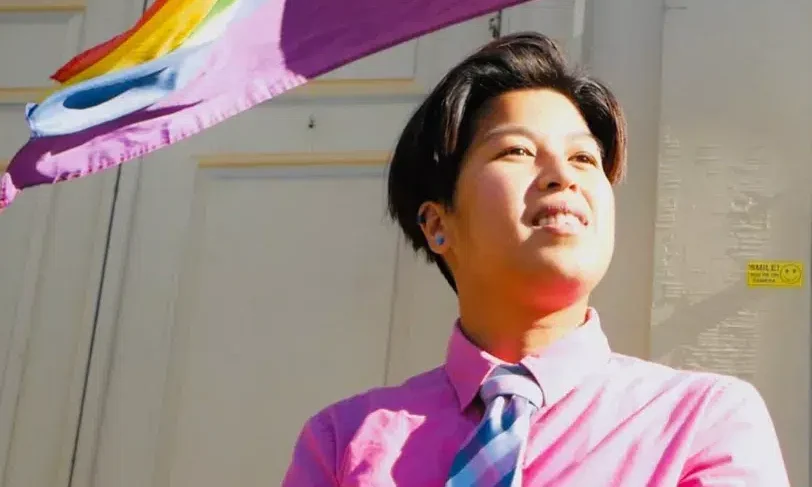Rep. Sarah McBride (D-DE), the first openly transgender person elected to the U.S. Congress, has been appointed Deputy Whip for Policy in the 119th Congress. The announcement marks a significant milestone in McBride’s political career as she continues to advocate for policy changes that directly impact the lives of working families, particularly in the areas of healthcare, housing, and child care.
“I’m thrilled to be named a Deputy Whip for Policy in the 119th Congress, advising House Democratic Leadership on policy priorities and plans for our caucus,” McBride wrote in a post on X (formerly Twitter). “Just as I was in the State Senate, I remain focused on lowering the cost of housing, health care, child care, and helping families thrive.”
McBride’s appointment as Deputy Whip for Policy is a reflection of her growing influence within the Democratic Party, as well as her unwavering commitment to pushing forward progressive policies that prioritize the well-being of American families. McBride has made it clear that she intends to work on legislation aimed at reducing the financial burdens many families face, particularly in terms of affordable healthcare, housing, and childcare costs.
My number one priority in Congress is helping to lower costs facing Delawareans and American families. We can do this by guaranteeing paid family and medical leave, lowering the cost of childcare and restoring the child tax credit.
— Congresswoman Sarah McBride (@mcbride.house.gov) 2025-01-16T21:51:06.364Z
On the social media platform Bluesky, McBride also shared her goals for the upcoming legislative session. “I want to make sure we pass bills that provide paid family and medical leave, lower the cost of childcare, and restore the child tax credit,” she stated, emphasizing her dedication to securing policies that provide economic relief to struggling families.
Understanding the Role of a Whip in Congress
In the U.S. House of Representatives, the role of a whip is essential for ensuring party discipline and unity when it comes to voting on legislation. A whip is responsible for rallying party members and ensuring they vote according to the party’s stance on important bills. The current Democratic whip is Rep. Katherine Clark (D-MA), and McBride’s new position as Deputy Whip for Policy will see her assisting in the development of key policy initiatives and working with Democratic leadership to shape the legislative agenda.
As Deputy Whip for Policy, McBride’s primary role will involve working closely with leadership to ensure that Democratic representatives are aligned on critical votes. She will also help drive discussions on policy priorities, particularly in areas that are close to her heart, including economic justice, healthcare access, and policies aimed at helping working families.
McBride’s Historic Election and Legislative Priorities
McBride made history in November 2022 when she became the first openly transgender person elected to the U.S. Congress. Her election to represent Delaware’s 1st District in the U.S. House of Representatives was widely seen as a victory for LGBTQ+ rights and a testament to the power of inclusivity in politics. In an interview on MSNBC after her win, McBride reflected on the significance of her historic election.
“I think this victory is a testament to Delawarians,” she said. “In our state of neighbors, we are fair-minded, that we judge candidates based on their ideas and not their identities. And I think voters across the state of Delaware — Democrats, independents, and Republicans alike — responded to our message of building a government that respects all of us.”
McBride’s campaign focused on policies aimed at supporting working families, regardless of party affiliation. “I was really singularly focused on bringing down costs facing workers, their families, and retirees,” she said. During her tenure in the Delaware Senate, McBride championed policies such as paid family and medical leave and led efforts to secure a substantial increase in the state’s Medicaid program. Her ability to work across the aisle, gaining bipartisan support, was a key aspect of her legislative success.
In contrast to the GOP’s anti-trans messaging, McBride ran a campaign centered on unity and inclusivity, focusing on practical solutions for everyday Americans. “We put forward a positive, inclusive message during the course of this year-and-a-half-long campaign, and I think voters really responded to that,” she added.
McBride’s Continued Advocacy for LGBTQ+ Rights
As the first openly transgender member of Congress, McBride has also become an advocate for LGBTQ+ rights on the national stage. Throughout her career, she has fought to ensure that LGBTQ+ individuals have access to the same rights and protections as everyone else. Her historic election was seen as a step forward for LGBTQ+ representation in politics, and her role as Deputy Whip for Policy will undoubtedly amplify her voice in future policy discussions.
McBride’s rise to leadership within the House Democratic Caucus is not only a victory for the LGBTQ+ community but also an indication of the growing influence of progressive voices within the party. Her advocacy for economic policies that benefit working families, combined with her commitment to LGBTQ+ rights, positions her as a key figure in shaping the direction of the 119th Congress.
As McBride begins her role as Deputy Whip for Policy, all eyes will be on her as she works to help pass vital legislation that addresses issues such as paid family leave, the cost of childcare, and healthcare access. Her leadership promises to be a powerful force in the ongoing fight for economic and social justice in America.
Rep. Sarah McBride’s appointment as Deputy Whip for Policy in the 119th Congress is a significant step in her political career and a testament to her unwavering commitment to progressive values. From advocating for affordable healthcare and housing to pushing for paid family and medical leave, McBride is dedicated to improving the lives of American families. As the first openly transgender person elected to Congress, McBride’s rise to leadership underscores the importance of diversity and inclusivity in shaping the nation’s legislative priorities.











